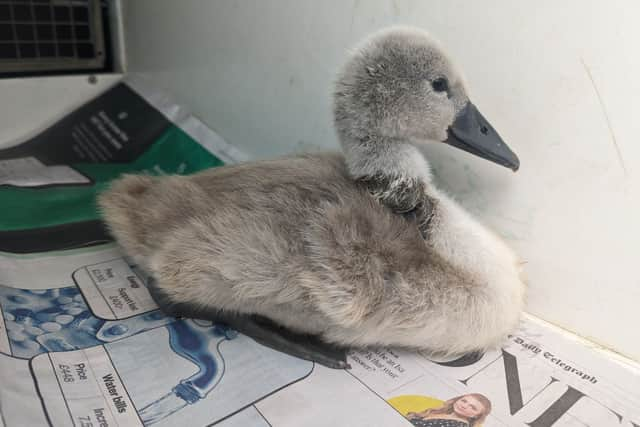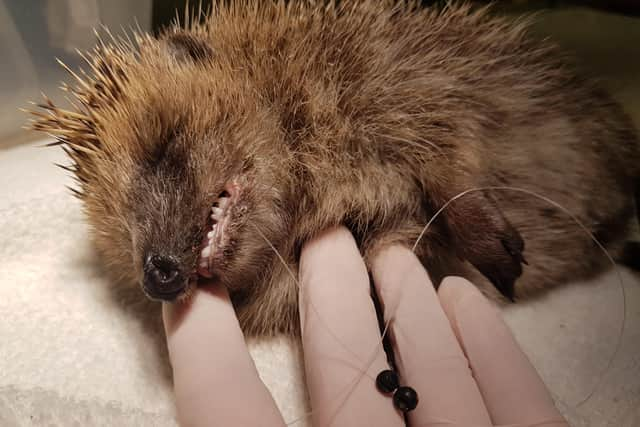Stark warning for anglers as RSPCA warns British wildlife injured by old fishing gear skyrocketing
Warning: readers may find some details of this story disturbing.
A cygnet with its oesophagus torn open, and a hedgehog which could not be saved after it swallowed a hook are just two of what the RSPCA warns could be many more victims of discarded fishing gear this summer.
Advertisement
Hide AdAdvertisement
Hide AdThe RSPCA has issued a warning to new and inexperienced anglers as National Fishing Month gets underway, after the number of calls in 2022 reporting wildlife injured by fishing litter almost doubled over the summer - with 186 reports in July compared to 94 in January.
The charity received 1,245 calls about fishing litter across England and Wales throughout the course of last year, with around half - or 614 - of those calls made between June and September.
RSPCA senior scientific officer Evie Button said the seasonal summer leap in the number of calls about wild animals injured by fishing litter was a real cause for concern.


"Animals like swans, geese and even hedgehogs are swallowing lethal fish hooks or piercing their beaks, or their wings or legs are getting tangled up in fishing line," she said.
Advertisement
Hide AdAdvertisement
Hide Ad"They’re suffering all sorts of awful injuries, sometimes with tragic consequences." While the RSPCA's inspectors and officers tried to rescue as many of the stricken animals as they could, even those able to be saved needed a lot of care, treatment and rehabilitation.
"Others aren’t so lucky and sometimes their injuries are just too severe for them to survive," she continued.


“It’s tragic for animal lovers like us to see the effects of this discarded litter, especially when there is such a simple solution: clear up your litter - whether it’s fishing-related or general - and take it home with you."
Not all parts of the UK were equal, the RSPCA's data showed. Across England and Wales, the five counties with the most fishing litter reports were - in order - Staffordshire, Greater Manchester, Merseyside, West Midlands, and Greater London.
Advertisement
Hide AdAdvertisement
Hide AdSome of the RSPCA's most disturbing incidents involved a young hedgehog in Cheshire which was brought into one of the charity's wildlife centres, after it was found entangled in fishing wire in a garden.
- Take old fishing line and spools to recycling points in local tackle shops or fisheries. Your nearest recycling point can be found on the Anglers National Line Recycling Scheme (ANLRS) website. Alternatively, old fishing line can be posted to the address on the ANLRS page.
- Be aware of surrounding trees – discarded line caught in foliage causes problems for wildlife.
- Don’t leave bait unattended – always remove it from the hook and put it in a safe place.
- Use a reusable bait container. Don’t take bait in tins.
- Dispose of any litter you see, even if it’s not your own.
When he was un-curled by staff, they discovered he had swallowed a fishing hook which had perforated his oesophagus. The hedgehog was put to sleep to avoid any further suffering.
In June, a swan with two fishing hooks embedded in his neck and beak was caught in Devon's River Dart by rescuers, who were luckily able to remove the hooks and return him to his home.
However, a young swan - or cygnet - discovered in Durham just last month was not so lucky, with the bird dying after a hook tore a hole the size of a 20 pence piece in its throat.
Advertisement
Hide AdAdvertisement
Hide Ad“Most anglers are very responsible when disposing of their litter, but unfortunately it only takes one piece of snagged or discarded fishing line to endanger the life of an animal. Discarded line, in particular, is a terrible hazard for wildlife, especially as it can be almost invisible," Ms Button said.
“We’re asking all anglers to be extra cautious and make sure nothing is left behind by following our simple steps to protect the environment and wildlife from harm.”
Comment Guidelines
National World encourages reader discussion on our stories. User feedback, insights and back-and-forth exchanges add a rich layer of context to reporting. Please review our Community Guidelines before commenting.
